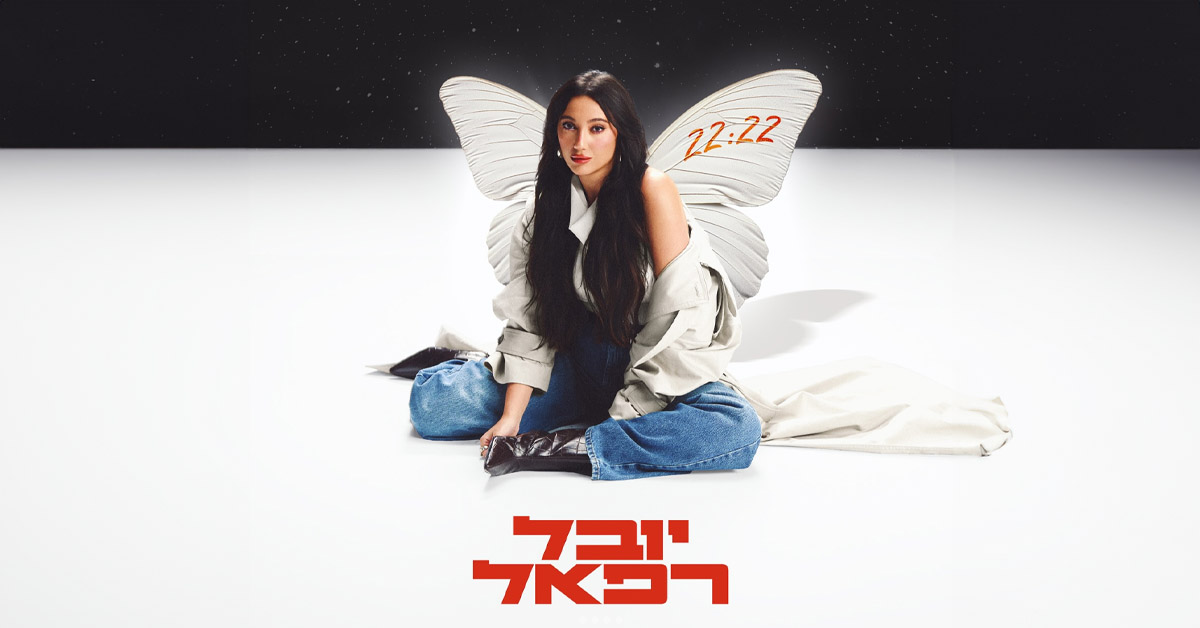
Eurovision 2025 runner-up and televote winner releases a moving mini-album inspired by her survival story, intertwining spirituality, healing, and hope two years after the Nova tragedy
Sometimes, small and seemingly random numbers turn into signs from the universe – sparks of light within a shaken reality. Two years after surviving the horrific Nova festival massacre, and months after winning hearts across Europe at Eurovision, Yuval Raphael returns with her debut mini-album (EP), a work that aims to heal, believe, and embrace the soul. The album includes three songs: “VeMa Itcha” (“And What About You”), “Kama Ahavti” (“How Much I Loved”), and “Yidalek Ha’Or” (“The Light Will Shine”). In two of them – “VeMa Itcha” and “Yidalek Ha’Or” – Raphael also co-wrote the lyrics.
“There isn’t a single day I don’t see the numbers 22:22 appearing somewhere”, said Raphael. “It follows me. This small thing keeps my spirit moving forward calmly, quietly, peacefully. I wanted to mark in it what has accompanied me so powerfully and consistently for two years. It’s the first time I release my own songs! It’s exciting, frightening, joyful – and this is my right path. I’m also thrilled to perform the new songs for the first time on stage during my upcoming show at Tel Aviv Amphitheatre”.
The Healing Journey Begins with “22:22”
For the first time since surprising Europe by finishing second in Eurovision 2025, Raphael releases new music. The singer announced her first mini-album, titled “22:22”. In a heartfelt social media post, she revealed that this seemingly mystical number has followed her through every step since the day that changed her life.
“It’s a number I see everywhere, it follows me”, she explained in a moving Instagram post. Behind these repeating digits lies a deep personal story that connects spirit, trauma, and renewed faith in life.
Two Years Since “The Shelter of Death”
Raphael’s words were published a day after October 7th – now a national day of mourning and remembrance. For her, it is also a deeply personal date. She was among the survivors of the Nova massacre, escaping the terrorists and hiding under bodies in what she calls the Shelter of Death – a moment that forever changed her life.
“Yesterday, two years ago, I experienced the most pivotal turning point of my life”, she wrote. “The person I knew and built until that day changed and faltered. Spirituality has accompanied me for a long time; you could even say it paved my way. Since that day, when I needed to find good to hold on to, my connection to spirituality became stronger than ever”.
Watch Raphael’s post below:
הצגת פוסט זה באינסטגרם
The Number That Signifies Hope
Amid fear, pain, and trauma, the digits 22:22 appeared repeatedly – becoming a personal symbol of hope. “At times I was terribly scared, feeling lost”, the singer confessed, “I started doubting whether I was truly healing from the trauma or making things worse. There were so much pain and frustration. And then, suddenly, I kept seeing 22:22 everywhere – once, twice, three times, ten times… so I gave in and looked up its meaning: ‘You’re on the right path’. That’s the message behind angel numbers. Since then, it’s been with me every day”.
What Are “Angel Numbers”?
“Angel numbers” is a spiritual belief where repeating numbers we encounter – such as 22, 111, 444, or 777 – carry divine or personal significance. For Raphael, 22:22 became a daily reminder of presence, comfort, and faith.
“There’s not a day when I don’t see it somewhere”, she shared. “On my phone, the TV receiver, or someone’s alert. My loved ones know me so well they even text me at that hour to make sure I didn’t miss it”.
“It Keeps My Spirit Alive”
Raphael is aware that not everyone will relate to this belief. “Maybe it sounds silly, and it probably won’t speak to everyone”, she admitted. “But this little thing keeps my soul moving forward – calmly, quietly, peacefully, with complete faith that I’m on the right path”.
Now, that path brings her back to music. “Very soon I’m releasing an EP with three new songs!” she announced. “When we discussed the album’s title, I already knew. I wanted it to mark what has accompanied me so strongly and consistently for two years”.
The National Memorial Ceremony for October 7th
The national memorial ceremony honoring October 7th began with a moving performance by Raphael together with Daniel Weiss of the song “HaDerech El HaKfar” (“The Road to the Village”), accompanied by violinist and hostage survivor Agam Berger. After the performance, the singer wrote on Instagram: “We are one. We hurt as one, fall apart together, heal together, cry together. We are one – incomplete until they return to us. Hug those around you. Be united, attentive, and compassionate”.
Watch the emotional performance below:
Between Eurovision and Spirituality – A New Chapter in Raphfael’s Journey
Yuval Raphael’s journey since Eurovision embodies a distinctly Israeli story – between trauma and rebirth, doubt and faith, pain and healing. Her new music reflects all these dimensions, with the number 22:22 continuing to appear in the background as a symbol of the right path and the soul’s strength to choose life.
Israel at Eurovision 2025
“New Day Will Rise” is the song performed by Yuval Raphael, who was chosen to represent Israel after winning the 11th season of “HaKokhav HaBa”. Israel advanced to the final after winning the second semi-final with 203 points and finished second overall with 357 points in the grand final. Israel ranked first in the public vote but only 14th with the jury. This marks the third consecutive year that Israel has reached the top five – an unprecedented achievement.
Eurovision 2026: This will be Israel’s 48th participation in Eurovision. Israel joined the contest in 1973 and has won four times. Its most recent victory was at Eurovision 2018 with the song “Toy”, performed by singer Netta Barzilai.

Email: [email protected]
Phone: +972-50-9441919
Maor Heumann has been writing about the Eurovision Song Contest and following it for over three decades. He has attended five contests and has found something to appreciate in almost every possible musical genre — from the sugary pop entries that finish last in the semi-finals to the quirky avant-garde pieces that even the competition’s juries struggled to connect with. He usually prefers original languages and songs with depth over Swedish-produced English clones — though he doesn’t promise to stick to that rule.
He grew up on the kibbutz of Sara’le Sharon, who instilled in him a love for music and created his first connection to the contest back in 1993 — before most of the current editorial team was even born.

